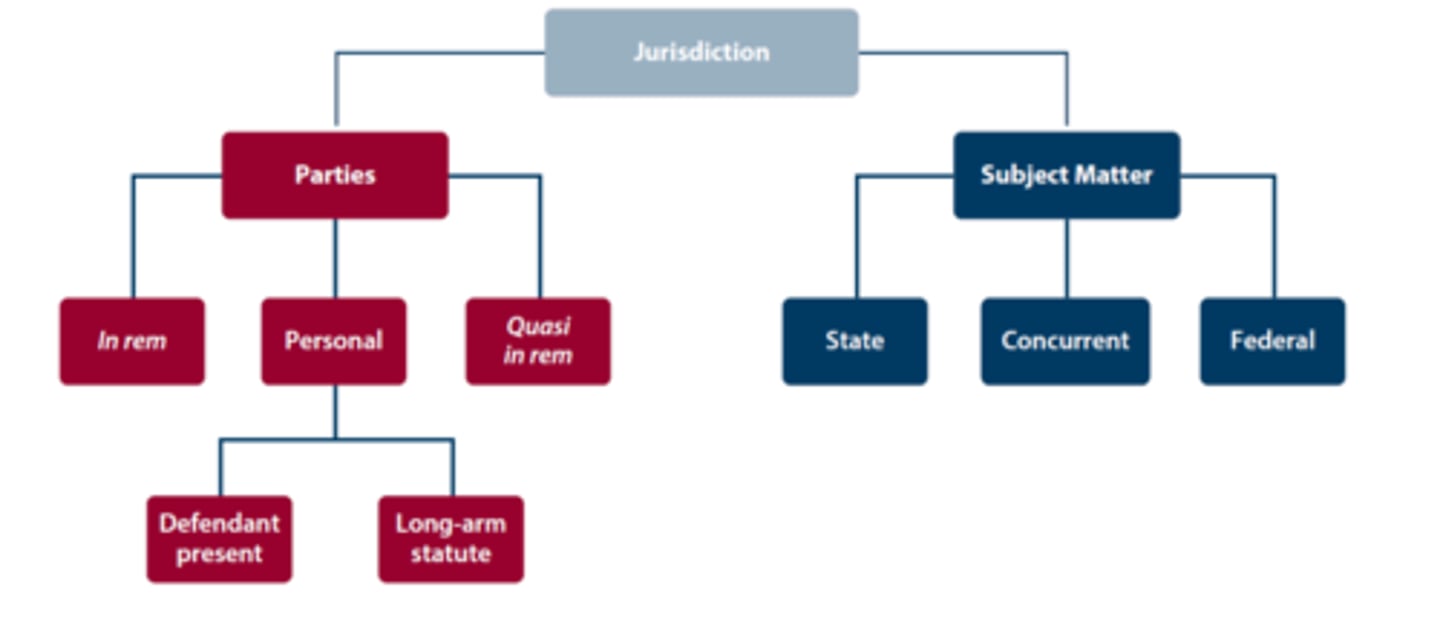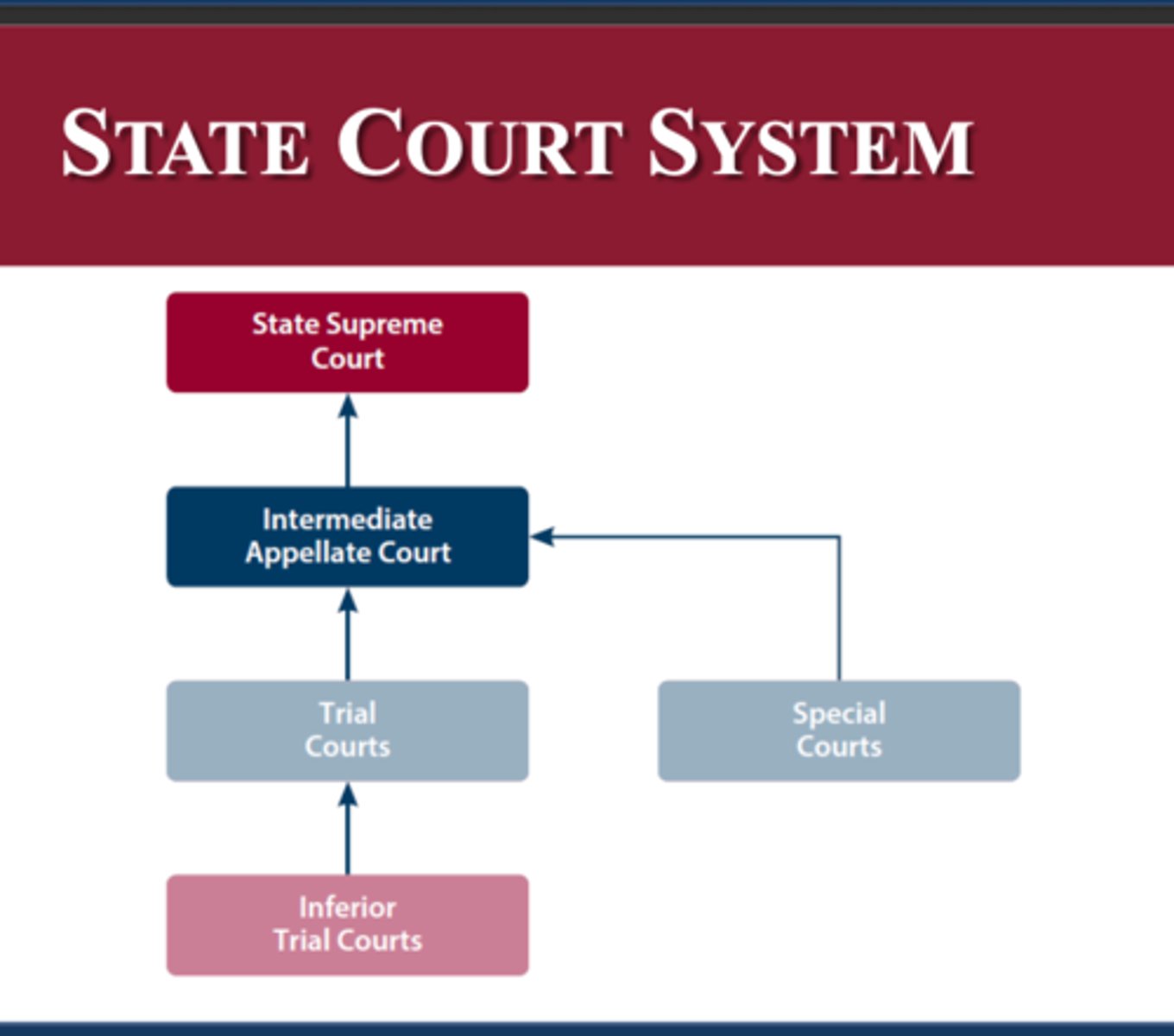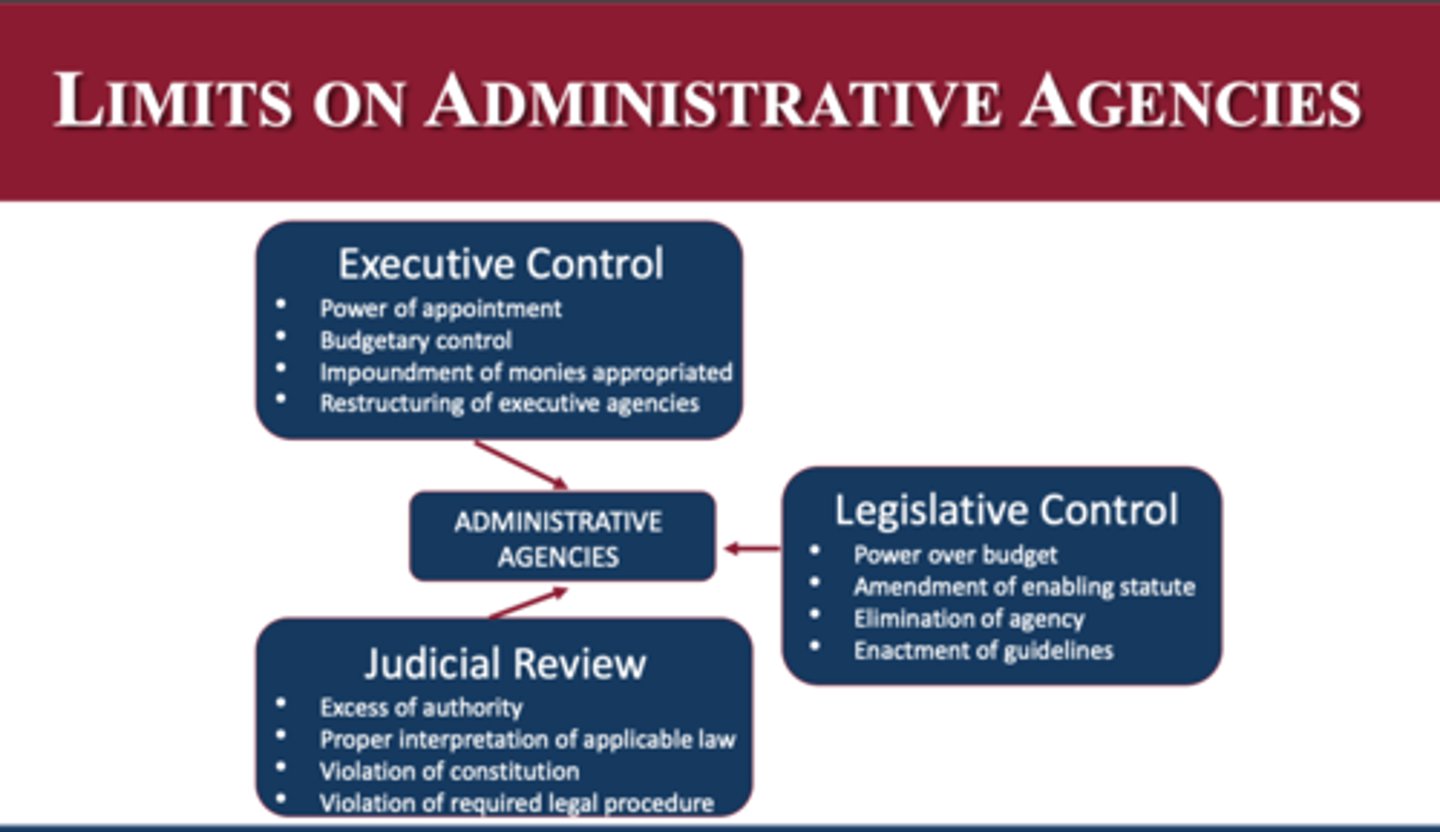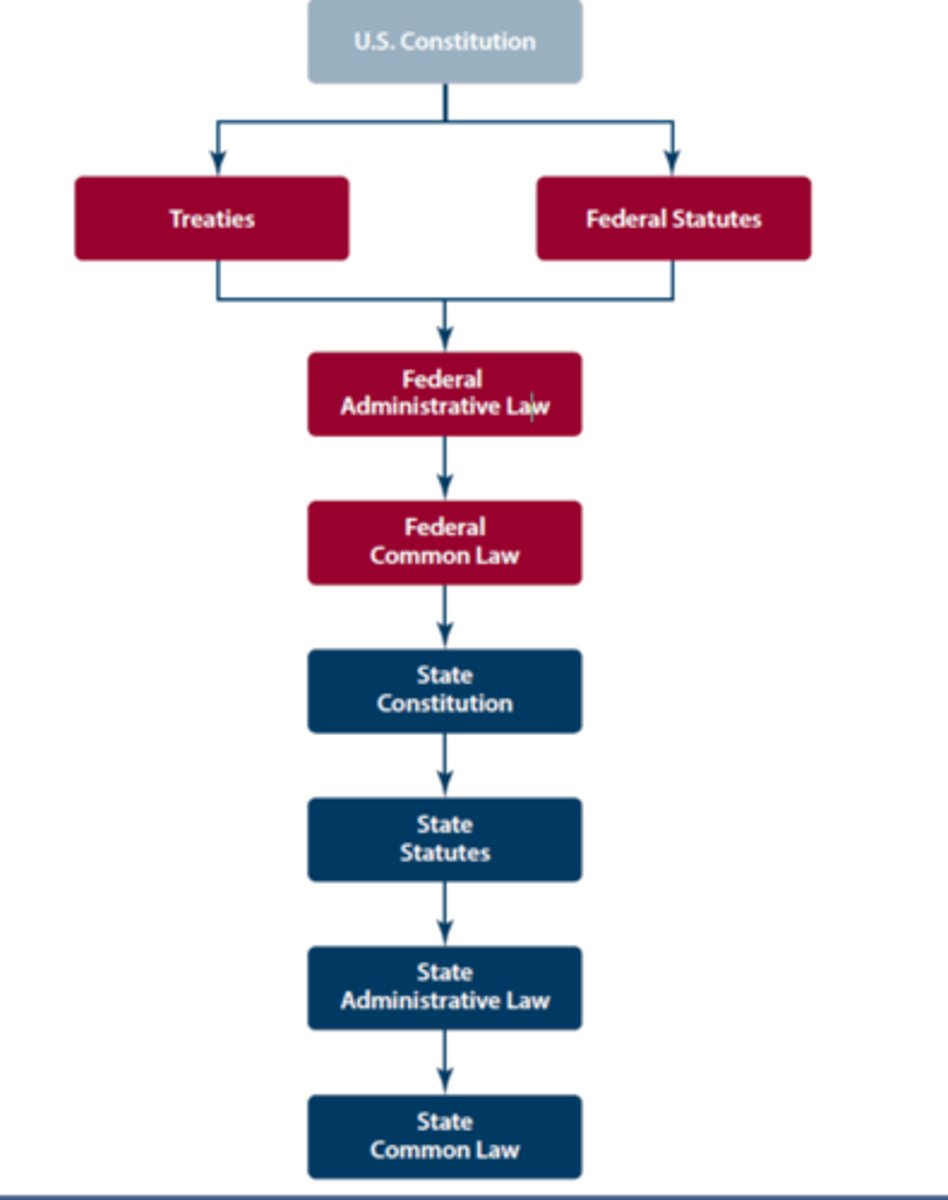business law and ethics test 1 9/11
1/55
There's no tags or description
Looks like no tags are added yet.
Name | Mastery | Learn | Test | Matching | Spaced |
|---|
No study sessions yet.
56 Terms
the law
reflects the social, economic, political,
religious and moral philosophy of society
functions of law
To maintain stability in the social, political, and
economic system through dispute resolution,
protection of property, and the preservation of the
state, while simultaneously permitting ordered
change.
when may a court render a binding decision?
only when it has jurisdiction over the dispute and the parties to the dispute; that is, when it has a right to hear and make a judgment in a case.
judges in the federal court system
appointed for life by the President, subject to confirmation by the Senate.
how many main levels does the federal court have?
3
special federal courts
courts established by Congress with Limited jurisdiction (ex. US tax court, US court of federal claims, US bankruptcy court, etc.)
the District of Columbia Circuit
Hears appeals from federal district courts in
Washington, DC, and has jurisdiction over a wide
range of federal law. considered the second most important court in the country and is responsible for deciding cases involving the balance of powers of the government.
the Federal Circut
Hears appeals from federal courts across the United States in specialized areas of law, such as patent laws, government contracts, and international trade. also has jurisdiction over appeals from the Court of International Trade and the Court of Federal Claims.
list the 9 state courts in MS
Supreme Court
Court of Appeals
Circuit Court
Chancery Court
County Court
Justice Court
Drug Court
Municipal Court
Youth Court
MS Supreme Court
The _______ is the court of last resort among state courts. Decisions of the Chancery, Circuit and County Courts and of the Court of Appeals may be appealed to this court. It has the least original jurisdiction (the authority of the court to adjudicate
the "original trial" (hear testimony, review evidence, enter a verdict). Its territorial jurisdiction
is the entire State of Mississippi. Decisions are by a majority vote of the court.
Appeals that go directly to MS Supreme Court
annexations, bond issues, constitutionality challenges, death penalty cases, disciplinary matters involving attorneys and judges, election contests, certified questions from federal court, utility rates, cases of first impression and issues of broad public interest.
MS Supreme Court Justices
- 9 positions elected from 3 districts
- non-partisan elections are staggered so that not all positions are up for election at once
- 8-year terms
- each justice participates in deciding appeals from the entire state
MS Court of Appeals
hears cases assigned by the MS Supreme Court. error correction court. hears and decides appeals on issues in which the law is already settled, but the facts are in dispute. The MS Supreme Court may review this court's decisions. If the MS Supreme Court declines review, the decision of this court stands.
The Mississippi Legislature created this court to speed appeals and relieve a backlog of cases before the MS Supreme Court. it began hearing cases in 1995.
MS Court of Appeals judges
- Ten judges are elected from five districts
- Non-partisan elections are staggered so that not all positions are up for election at one time
- judges serve eight-year terms
- judges hear cases from all over the state
MS Circuit Courts
hear felony criminal prosecutions and civil lawsuits. also hear appeals from County, Justice and Municipal courts and from administrative boards and commissions such as the Workers' Compensation Commission and the Mississippi Department of Employment Security.
There are 22 districts and 53 judges. Trials are heard with a 12-member jury and usually one or two alternate jurors. A judge may preside without a jury if the dispute is a question of law rather than fact.
MS Circuit Court judges
-53 judges
- number per district ranges from 1 to 4
-selected in non-partisan elections
- serve four-year terms
MS Chancery Court
have jurisdiction over disputes in matters involving equity; domestic matters including adoptions, custody disputes and divorces; guardianships; sanity hearings; wills; and challenges to constitutionality of state laws. Land records are filed here.
these courts have jurisdiction over juvenile matters in counties which have no County Court. The chancellor may appoint a lawyer in private practice to sit as a youth court referee to hear juvenile matters such as delinquency, abuse and neglect.
Trials are typically heard by a chancellor without a jury, although state law allows parties
to request a jury in this court.
define equity in terms of the law
a particular set of remedies and associated procedures involved with civil law
MS County Courts
have exclusive jurisdiction over eminent domain proceedings and juvenile matters, among other things. In counties which have a this court, a judge also serves as the Youth Court judge. these courts share jurisdiction with Circuit and Chancery Courts in some civil matters. The jurisdictional limit of these courts is up to $200,000. they may handle non-capital felony cases transferred from Circuit Court.
Mississippi has 21 of these courts and 30 judges. Counties which have this kind of court include Adams, Bolivar, Coahoma, DeSoto, Forrest, Harrison, Hinds, Jackson, Jones, Lamar, Lauderdale, Lee, Leflore, Lowndes, Madison, Pearl River, Pike,
Rankin, Warren, Washington and Yazoo.
MS County Court judges
- may issue search warrants, set
bond and preside over preliminary hearings
- have concurrent jurisdiction with Justice Courts in all matters, civil and criminal
- serve four-year terms. Elections are non-partisan.
MS Justice Courts & judges
have jurisdiction over small claims civil cases involving amounts of $3,500 or less, misdemeanor criminal cases and any traffic offense that occurs outside a municipality.
judges may conduct bond hearings and preliminary
hearings in felony criminal cases and may issue search warrants.
There are 82 courts with 197 judges. these are the only Mississippi judges elected in partisan races. They serve four-year terms.
MS Drug Court
special courts which address crimes committed by persons addicted to drugs or alcohol. seek to rehabilitate drug-using offenders through drug
treatment and intense supervision with drug testing and frequent court appearances. offer the incentive of a chance to remain out of jail and be employed, and the sanction of a jail sentence if participants fail to remain drug-free and in compliance with all program requirements.
As of April 2025, 42 of these courts were in operation in Mississippi.
MS Municipal Courts & judges
have jurisdiction over misdemeanor crimes, municipal ordinances and city traffic violations. judges may conduct initial appearances in which
defendants are advised of the charges being filed, as well as bond hearings and preliminary hearings.
There are 226 courts. Most municipalities have one municipal judge, although a few jurisdictions have several.
Most municipal judges are appointed by governing bodies of municipalities. Terms of office vary.
MS Youth Courts
deal with matters involving abuse and neglect of juveniles, as well as offenses committed by juveniles. Young people who have not reached the age of 18 may be subject to this court, although there are some exceptions. Some offenses
which would be treated as crimes if committed by adults are known as delinquent acts when they involve juveniles.
In the 21 counties which have a County Court, those judges also serve as judges in this court. In counties which do not have a County Court, the Chancery Judge may hear this court's matters, or the Chancery Judge may appoint a lawyer to act in a judicial
capacity as this court's Referee. The city of Pearl also has its own municipal ______ court.
voir dire
the process of selecting a jury; literally means "say or see the truth"; each party has an unlimited number of challenges for cause and a limited number of peremptory challenges
federal supremacy
federal law takes precedence over conflicting state law; "preempts"
federal preemption
right of federal government to regulate matters within its power to the exclusion of regulation by the states
separation of powers
- legislative: makes laws
- executive: enforces laws
- judicial: interprets laws
how does the US Supreme Court interpret the Commerce Clause?
as virtually complete power to Congress to
regulate the economy and business (general welfare of the nation)
equal protection
a principle, rooted in the 14th Amendment, that ensures the government must apply laws equally to all people, preventing discrimination.
It requires that similarly situated person be treated
similarly by government actions
Fifth and Fourteenth Amendments
prohibit the federal and state governments from depriving any person of life, liberty, or property without due process of law
list congress' four broad categories of activities it can constitutionally regulate under the "commerce power"
• Channels: Highways, waterways, air
• Instrumentalities: People, machines, and other things used to carry out commerce
• Articles moving: Driver information
• Substantial Effect: Broadest: any commercial activity and non-commercial activity
connected to interstate commerce
administrative laws have what authority?
the force and effect of law/statute (Dierson V. Chicago Car Exchange (1997)
generally administrative agencies have these authorities:
• Conducting audits
• Issuing Permits/Licenses
• Revoking Licenses
• Levying fines or civil penalties
• Investigating violations to ensure compliance with agency
regulations
• Issuing Cease and Desist orders
how far does administrative enforcement power extend?
GENERALLY DOES NOT EXTEND TO CONVICTING PERSONS OF CRIMINAL VIOLATIONS. (mostly enforces civil violations)
parties seeking to challenge agency action must:
HAVE STANDING AND HAVE EXHAUSTED THEIR ADMINISTRATIVE REMEDIES
Government in the Sunshine Act
at the federal level, meetings are open to the public under this act. things can't be done "in the dark" (with exceptions)
Freedom of Information Act (FOIA)
a federal law that gives the public access to records from any federal agency. The main purpose is to ensure an informed citizenry and promote government transparency.
Loper Bright Enterprises v. Raimondo
this decision changed administrative law by giving courts more power to interpret statutes and less power to federal agencies
What changed when the Chevron Doctrine was overruled by Loper Bright Enterprises v. Raimondo?
- Courts can now interpret statutes without deferring to agency interpretations.
- Courts can use traditional statutory interpretation tools, like plain language and congressional intent.
- The ruling could lead to more litigation and weaken federal agencies' enforcement powers.
What does the due process clause of the 5th and 14th amendments
prohibit?
prohibit the federal and state governments from depriving any person of life, liberty, or property without due process of law
What does the 1st Amendment protect?
free speech, including corporate political speech (a corporation's right to speak out on political issues) and commercial speech (expression related to the economic interests of the speaker and its audience; receives a lesser degree of protection.) has limits (defamation)
What does the Commerce clause do?
allows laws passed by the federal government to override state laws that affect interstate commerce. The Dormant Commerce Clause ("Negative") automatically invalidates a protectionist state law, whether or not the federal government has legislated on the issue; restricts the states' power to regulate activities if the result obstructs interstate commerce.
What is Equal Protection?
a principle, rooted in the 14th Amendment, that ensures the government must apply laws equally to all people, preventing discrimination. It requires that similarly situated person be treated similarly by government actions
What are the three branches of government?
- legislative: makes laws
- executive: enforces laws
- judicial: interprets laws
What is the principle of "separation of powers"?
allocation of powers among executive, legislative,
and judicial branches of government. establishes checks and balances to ensure that no area of government has too much power.
1 PG DISCUSSION: What is Jurisdiction (different types, also look at in personam and in rem)
Jurisdiction: power or authority of court to hear/decide case
1.Subject Matter Jurisdiction-Authority of a court to judge a controversy of a particular kind of case.(family law, criminal law, civil law)
1A.Exclusive Federal Jurisdiction: Fed jurisdiction is exclusive only if Congress so provides, either explicitly or implicitly
1B.Concurrent Federal Jurisdiction-Fed jurisdiction is concurrent with state jurisdiction in cases of fed questions (unless there is exclusive fed jurisdiction) and in diversity cases (Diversity of Citizenship where Plaintiffs&defendants from different states&amount in controversy is over $75k, Foreign country brings suit against US citizens, Suit between US citizen and citizens of foreign country) 1C exclusive state jurisdiction: jurisdiction over all other(non-federal) matters;
2.In Personam Jurisdiction-The power of a court to adjudicate matters directed against a party; Based upon claims "against the person", in contrast to jurisdiction over the person's property; exercised over a person who resides, maintains connections, or is served notice of legal proceedings in that location. may also exercise jurisdiction over a person who
consents to be subject to it. judgments can be enforced against the person where she is, while disputes over property must take place in its
particular location
3.In Rem Jurisdiction-power of a court over an item of real or personal property. based on claims against property. "against a thing". The "thing" over which the court has power may be a piece of land or even a marriage. Thus, a court with only in-rem jurisdiction may terminate a marriage or declare who owns a piece of land. based on the location of the property and enforcement follows property rather than person
3A.Quasi in Rem(Attachment Jurisdiction)-jurisdiction over defendant's property to obtain paymen

1 PG DISCUSSION: How does is a civil action (lawsuit) commence, describe the process from beginning to end)? (don't just list, he wants it in your own words)
Plaintiff:
▪ 1.) Voir Dire (jury selection
process; attempt by both sides
to avoid jury bias)
▪ 2.)Opening Statements
▪ 3.) P Case: Burden of Proof-
must persuade the trier of fact
of the merits of the case.
▪ 4.) Direct Examination of W
▪ 6.) Re-Direct Exam. Plaintiffs
Witness
▪ 8.)Rebuttal: P rebuttal to D's
case
▪ 10.) Closing Arguments
▪ Defendant:
▪ 1.) Voir Dire
▪ 2.)Opening Statements
▪ 5.)Cross-Examination of
Plaintiff's witness relating to
issues from Direct Examination
▪ 7.) D Case: must rebut P
evidence, prove any affirmative
defenses, prove D allegations in
any cross complaint.
▪ 9.) Rejoinder: D can call
additional witness and
introduce other evidence to
counter P rebuttal.
▪ 10.) Closing Arguments (*lawsuit ends when appeal process finished and not when decision is rendered! must enforce the judgement, talk about appeal process, etc.)
1 PG DISCUSSION: Describe the court systems of the Federal and State Judiciary? Be able to explain the levels of courts (including the three levels of Federal court).
federal courts:
- judges are appointed for life by the president
- 3 main levels:
1. district courts: trial courts of general jurisdiction that can hear and decide most legal controversies in the federal system
2. court of appeals: hear appeals from district courts and review orders of certain administrative agencies
2A: District of Columbia Circuit: hears appeals from federal district court in Washington, DC, and has jurisdiction over a wide range of federal law. 2nd most important court in the country and responsible for deciding cases involving the balance of powers of the government
2B: Federal Circuit: Hears appeals from federal courts across the United States in specialized areas of law, such as patent laws, government contracts, and international trade. The Federal Circuit also has jurisdiction over appeals from the Court of International Trade and the Court of Federal Claims.
2c: states and territories are grouped into 3 or 4 and each assigned a circuit
3. the Supreme Court: nation's highest court, whose principal function is to review decisions of the federal courts of appeals and the highest state courts
* special courts: have jurisdiction over cases in a particular area of federal law: US tax court, court of federal claims, court of international trade, bankruptcy court, court of appeals for the armed forces, court of appeals for veterans claims
state courts:
- inferior trial courts: hear minor criminal cases,
such as traffic offenses, and civil cases involving
small amounts of money; conduct preliminary
hearings in more serious criminal cases.
- trial courts: have general jurisdiction over civil
and criminal cases.
- appellate courts: include one or two levels; the
highest court's decisions are final except in those
cases reviewed by the U.S. Supreme Court.

Understand how Administrative agencies work and the authority they possess.
- fall under executive branch, but have authority to make rules, enforce rules, and punish violations of their rules within their scope
- interpretive rules (indicates how agency interprets statutes/rules it administers) and procedural rules (establish its organization, method of operation, and rules of conduct)
- enforcement: process by which agencies determine whether their rules have been violated.
- adjudication: formal methods by which an
agency resolves disputes.
- Generally Administrative Agencies have the authority: Conducting audits, Issuing Permits/Licenses, Revoking Licenses, Levying fines or civil penalties, Investigating violations to ensure compliance with agency regulations, Issuing Cease and Desist orders
- limits on administrative agencies: power generally does not extend to convicting persons of criminal violations, parties seeking to challenge agency action must have standing and must have exhausted their administrative remedies, legislative control (control over agency's budget and enabling statute) and executive branch control (includes the president's power to appoint members of the agency), disclosure of information required by congress: public disclosure which enhances oversight of agency activities (freedom of information act, privacy act, government in the sunshine act)

Understand the hierarchy of laws and what happens when there is a conflict of laws?
- legislative law: statutes adopted by legislative bodies; includes treaties and executive orders
- administrative law: rules, regulations, orders, and decisions made by administrative agencies
- when there is a conflict of laws, the highest law on the hierarchy stands. for example, a state cannot make a law that takes away freedom of speech because it is protected under the constitution (which has more authority than the state).

"to sue"
to begin a lawsuit in court
defendant
person against whom legal action is brought
plaintiff
initiator of lawsuit
supreme law of the land
the constitution
legislative laws
create statutes (bill to law): To regulate, to authorize, to outlaw, to provide (funds), to sanction, to grant, to declare, or to restrict. (rules/regulations and ordinances fall under the executive branch)